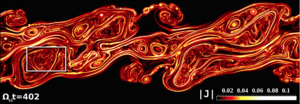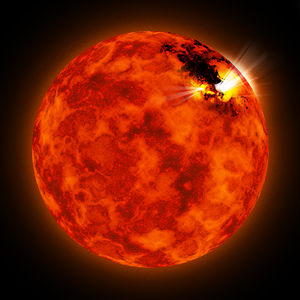Ask A Physicist: Difference between revisions
From AAP
Jump to navigationJump to search
No edit summary |
|||
| (104 intermediate revisions by 2 users not shown) | |||
| Line 1: | Line 1: | ||
' | [[Image:L_dwarf_flare.jpg|thumb|300px|right|Studies of a brown dwarf with the Kepler mission by University of Delaware Professor John Gizis have revealed evidence of a long-lasting starspot and frequent white light flares that rival the most powerful seen on the Sun. This is an artist's conception drawn by Rob Gizis.]] | ||
== | Have a physics or astronomy question? Whether you're curious about tiny, elusive neutrinos or the most massive black holes in the universe, we can help. | ||
* [ | |||
* [ | We are graduate students, research scientists and faculty in the Department of Physics and Astronomy at University of Delaware. We are developers of quantum computers, space weather forecasters, planet hunters and more! | ||
* [ | Please email your question to '''askaphysicist@physics.udel.edu'''. Scroll down for information on who can ask questions and how to phrase your question. | ||
== New Questions == | |||
'''Radioactive Glassware''' | |||
* [[Bakeware radioactivity|Can a glass pie pan (Corningware) become radioactive and emit dangerous radiation?]] | |||
'''Ferromagnetism''' | |||
* [[Ferromagnetism|How would one analytically calculate the force on a ferromagnetic object, like an iron sphere, from a permanent magnet?]] | |||
'''Color Vision''' | |||
* [[Color Mixing|Why is it that colours of the visible spectrum (e.g. orange) can be "faked" by mixing other colours (e.g. red and yellow)?]] | |||
'''Big Bang''' | |||
* [[Origin of Space|How does something explode into a non existent space? It would seem to | |||
me that would be theoretically impossible!]] | |||
'''Attraction and Repulsion of Two Charged Particles''' | |||
* [[Virtual Photons|Could you please tell me how quantum field theory describes the attraction and repulsion of two charge particles via exchanging photons?]] | |||
== Favorites == | |||
'''Extraterrestrial life''' | |||
* [[Life on other planets|What's the percentage of habitable planets in the Galaxy? What's the current estimate of how may planets have life?]] | |||
'''Big Bang -> Black Hole?''' | |||
* [[Big bang black hole|Consider our universe at the moment of the Big Bang, or perhaps a very brief moment after the initiation of the Big Bang. Wouldn't the mass density of the universe at the moment of the Big Bang have been sufficient to form/maintain a black hole rather than an explosive expansion?]] | |||
'''Blue light and sleep deprivation''' | |||
* [[Blue light and sleep deprivation|I was recently advised to switch to red lights in the evening to help with my sleep patterns. I am told that the key is to achieve light as red as possible on the spectrum. Can this be achieved by filtering a white light through a red cover or does the light emitted have to be intrinsically red itself (eg the difference between a Christmas light with a red cover and a red heat night light for reptiles)?]] | |||
[[Image:Shay_turbulence_sim.png|thumb|300px|Bill Matthaeus and Mike Shay's research groups conduct computer simulations of turbulence in plasmas. This rendering of fully developed turbulence is from the 2013 paper "Coherent structures, intermittent turbulence, and dissipation in high-temperature plasmas," by Karimabadi et al. (Physics of Plasmas 20, 012303).]] | |||
== Question Archive == | |||
* [[:category:light|Light and Photography]] | |||
* [[:category:Particles|Particles]] | |||
* [[:category:neutrinos|Neutrinos]] | |||
* [[:category:electricity and magnetism|Electricity and magnetism]] | |||
* [[:category:Solar System|Solar System]] | |||
* [[:category:extrasolar planets|Extrasolar planets]] | |||
* [[:category:Life|Life in the universe]] | |||
* [[:category:brown dwarfs|Brown dwarfs]] | |||
* [[:category:gravity|Gravity]] | |||
* [[:category:black holes|Black holes]] | |||
* [[:category:special relativity|Special relativity]] | |||
* [[:category:general relativity|General relativity]] | |||
* [[:category:dark energy|Dark Energy]] | |||
* [[:category:Big bang|Big Bang]] | |||
* [[:category:time|Time]] | |||
* [[:category:cosmology|Cosmology]] | |||
* [[:category:Radioactivity|Radioactivity]] | |||
* [[:category:thermodynamics|Thermodynamics]] | |||
* [[:category:science history|History of science]] | |||
* [[:category:space race|The Space Race]] | |||
* [[:category:K-12 Education|K-12 Education]] | |||
== Who can ask questions? == | |||
* We welcome questions from K-12 students and teachers. We ask that students put their age or grade level in the email so we can answer at the appropriate level. | |||
* Non-scientist members of the general public are also encouraged to submit questions. To help us answer at the right level, it's helpful if you add a little bit about your background -- for example, "I'm an accomplished amateur astronomer" or "I'm usually not interested in science, but I read something about climate change and I want to find out if it's true." | |||
* College students may submit questions as long as they are not homework questions (see below). We can help with general physics concepts, but we will not compute or calculate anything for you. | |||
* We advise journalists working on deadlines to contact individual scientists directly, rather than send questions to Ask A Physicist. The contributors to this page are volunteers, and we cannot guarantee that questions will be answered immediately. | |||
* Professional physicists or astronomers should not use this service. We do not review manuscripts or check calculations. | |||
== How should I phrase my question? == | |||
* Make it specific enough that we can answer it in 1-2 paragraphs: "What types of nuclear reactions can produce neutrinos?" rather than "Tell me everything you know about neutrinos." | |||
* However, if you make it too specific, you will trigger our '''homework question alert.''' Questions such as "Describe the five ways to measure the temperature of a star" or "If I throw a ball upward at 2 meters per second from a height of 1.5 meters, how high will it go?" will not be answered. | |||
* We might not be able to help with questions that are specific to your locale, such as "What was that flash I saw in the sky at 10:00 PM last night?" | |||
Latest revision as of 12:18, 23 August 2018
Have a physics or astronomy question? Whether you're curious about tiny, elusive neutrinos or the most massive black holes in the universe, we can help.
We are graduate students, research scientists and faculty in the Department of Physics and Astronomy at University of Delaware. We are developers of quantum computers, space weather forecasters, planet hunters and more!
Please email your question to askaphysicist@physics.udel.edu. Scroll down for information on who can ask questions and how to phrase your question.
New Questions
Radioactive Glassware
Ferromagnetism
Color Vision
Big Bang
Attraction and Repulsion of Two Charged Particles
Favorites
Extraterrestrial life
Big Bang -> Black Hole?
Blue light and sleep deprivation

Bill Matthaeus and Mike Shay's research groups conduct computer simulations of turbulence in plasmas. This rendering of fully developed turbulence is from the 2013 paper "Coherent structures, intermittent turbulence, and dissipation in high-temperature plasmas," by Karimabadi et al. (Physics of Plasmas 20, 012303).
Question Archive
- Light and Photography
- Particles
- Neutrinos
- Electricity and magnetism
- Solar System
- Extrasolar planets
- Life in the universe
- Brown dwarfs
- Gravity
- Black holes
- Special relativity
- General relativity
- Dark Energy
- Big Bang
- Time
- Cosmology
- Radioactivity
- Thermodynamics
- History of science
- The Space Race
- K-12 Education
Who can ask questions?
- We welcome questions from K-12 students and teachers. We ask that students put their age or grade level in the email so we can answer at the appropriate level.
- Non-scientist members of the general public are also encouraged to submit questions. To help us answer at the right level, it's helpful if you add a little bit about your background -- for example, "I'm an accomplished amateur astronomer" or "I'm usually not interested in science, but I read something about climate change and I want to find out if it's true."
- College students may submit questions as long as they are not homework questions (see below). We can help with general physics concepts, but we will not compute or calculate anything for you.
- We advise journalists working on deadlines to contact individual scientists directly, rather than send questions to Ask A Physicist. The contributors to this page are volunteers, and we cannot guarantee that questions will be answered immediately.
- Professional physicists or astronomers should not use this service. We do not review manuscripts or check calculations.
How should I phrase my question?
- Make it specific enough that we can answer it in 1-2 paragraphs: "What types of nuclear reactions can produce neutrinos?" rather than "Tell me everything you know about neutrinos."
- However, if you make it too specific, you will trigger our homework question alert. Questions such as "Describe the five ways to measure the temperature of a star" or "If I throw a ball upward at 2 meters per second from a height of 1.5 meters, how high will it go?" will not be answered.
- We might not be able to help with questions that are specific to your locale, such as "What was that flash I saw in the sky at 10:00 PM last night?"
